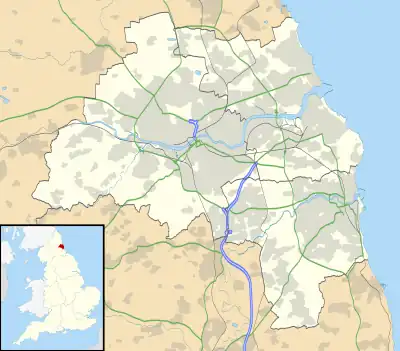| St John the Baptist | |
|---|---|
 | |
 St John the Baptist | |
| 54°58′12″N 1°36′56″W / 54.9701°N 1.6155°W | |
| OS grid reference | NZ245639 |
| Location | Grainger Street, Newcastle upon Tyne NE1 5JG |
| Country | England |
| Denomination | Anglican |
| Churchmanship | Traditional Catholic |
| History | |
| Status | Parish church |
| Architecture | |
| Functional status | Active |
St John's Church is a 13th-century church on the corner of Grainger Street and Westgate Road in Newcastle upon Tyne, England, dedicated to St John the Baptist. It is a Grade I listed building.[1]
History and Building Description
The old church of St. John is believed to date from c.1287.[2] William Gray, a 16th century topographer and burgess of Newcastle-upon-Tyne, called it "a pretty little church, commended by an arch-prelate of this kingdom because it resembled much a cross".[3]
The church, surrounded by modern buildings on three sides, is modest, with a low square tower featuring small pinnacles and windows with flattened arched tops. A stone in the south transept window commemorates Robert Rhodes, the builder of St. Nicholas' Cathedral's steeple in Newcastle, and a benefactor to the town's churches. The current stone is a copy of the original, removed around 1861 during repairs, and now housed in the castle.[4]
Interior
The 15th-century font cover and the Jacobean pulpit are examples of local woodwork. The chancel, now the Lady Chapel, contains a window including the fragments of medieval glass with the earliest known representation of the arms of Newcastle. Further along the wall is a cruciform opening which enabled the anchorite, whose cell was above the present sacristy, to see the altar. The rood and reredos are both the work of Sir Charles Nicholson.[5]
Graveyard

Part of the graveyard was built over in the 1960s for meeting rooms and a hall. As of 2010, there remained about ten gravestones. Two of these, that to Sarah and Sarah Hodgson,[6] owners of the Newcastle Chronicle and that to the artist Ralph Waters[7] are listed Grade II.
Irish actor and poet John Cunningham is buried in the graveyard.[8] Not far from the east window lies a stone slab, part of a table monument, its four supporting pillars lying half buried in the soil beneath it. The inscription on it reads as follows:
|
Here lie the Remains of |
See also
References
- ↑ "CHURCH OF ST JOHN THE BAPTIST, Non Civil Parish - 1024728 | Historic England". historicengland.org.uk. Retrieved 6 September 2022.
- ↑ "St John's church | British History Online".
- ↑ Gray, William (1649). Chorographia, or, A survey of Newcastle upon Tine.
- ↑ Charleton, R.J. (n.d.). A history of Newcastle-on-Tyne from the earliest records to its formation as a city. London: Walter Scott Ltd. pp. 142–145.
- ↑ "St. John the Baptist's Church, Grainger Street, Newcastle". Retrieved 9 April 2010.
- ↑ "HODGSON TOMB ABOUT 15 METRES EAST OF CHURCH OF ST JOHN THE BAPTIST, Non Civil Parish - 1024730 | Historic England". historicengland.org.uk. Retrieved 7 September 2022.
- ↑ "WATERS TOMB ABOUT 2 METRES SOUTH OF CHURCH OF ST JOHN THE BAPTIST, Non Civil Parish - 1024729 | Historic England". historicengland.org.uk. Retrieved 7 September 2022.
- ↑ "St John's church | British History Online".